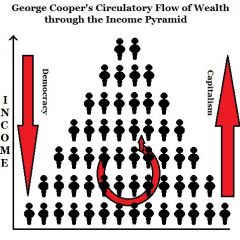Managing trade is a government responsibility. It should lead to increasing jobs and wages.
Business and Trade
Someone has suggested that trade is good for the economy, since the advocacy of business for more trade proves this to be the case. Yet it would be unnatural (and should not happen from a governance perspective) for businesses to put increasing jobs and wages for the nation as a whole as a priority in their boardrooms. Just saying this makes it sound as ridiculous as Senator Sanders’ continual attack, in the US context, upon business profits.
Adam Smith’s “Invisible Hand”
It is the government that has actually made Adam Smith’s “Invisible Hand” work with all the power it has manifested in the 19th and 20th century. It did not happen by some wonderful and mysterious alchemy, as some economists seem to think. Yes, protectionist trade policies can lead to increasing jobs and wages.
It is the government’s job to make sure that trade agreements it signs increase jobs and wages; it is not the job of business.
Yes. It is amazing, but the governments of USA and Australia have delivered the fundamentals of economic growth, mostly through protectionist policies in the 19th century (USA) and in the 20th century (Australia). They did actually increase jobs and wages.
In the US context, only Donald Trump has realised the truth of this obvious point. Certainly not most “economic experts.”
Economists are yesterday’s prophets
Recent history has shown that so-called economic experts are blind to economic and political facts. They are stuck in a 1820’s paradigm. Despite having had nearly 200 years to check out whether Comparative Advantage works or not for ordinary workers without government oversight, they haven’t bothered.
Nationalism is the only way forward
Most commentators are totally blind to benefits of a revival of nationalism. Yet this will again see governments looking after the interests of voters. How can it be otherwise in a democracy? Do commentators think that increasing jobs and wages for ordinary workers (voters) is not important?
Today, in the Australian, Bernard Salt pointed out that only 300,000 jobs have been lost in manufacturing over the last 16 years, but 1.3 million jobs have been added elsewhere. Yet despite the superficial appeal of this analysis for the zero-tariff argument, it actually means that 300,000 people are now out of a job and will not be able to retrained in anything like the jobs that they have lost. They are NOT going to get jobs in the rapidly growing medical / health industry, except as janitors and ancillary staff. Perhaps they can all become baristas in the food service industry! Is that the best we can offer?
Yet a modest tariff regime that would increase the probably of these people being employed in paid jobs, suited to their skills and abilities. Sure, well-paid medical workers and economists might have to pay 10% more for some goods, but they can afford it!
Sometimes we forget that an average IQ is 100, not 150, even in the USA or Australia! Not everyone can be trained for a highly-skilled job.
Increasing jobs and wages
Jobs and wages are more important than ever-cheaper goods. Who can deny it? Apparently, almost all economists. Unfortunately they are leading a declining bunch of out-of-date politicians by the nose to their decline and eventual irrelevancy.
Nationalism will eventually prevail over the current ideologically driven, dominant, economic approach.
Bring on the day! In USA, Donald Trump has began to introduce a tariff regime that is fair to the USA.
